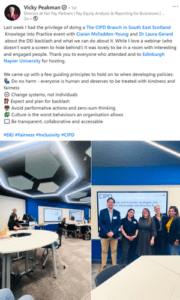Vicky Peakman is a fair pay specialist who has dedicated her career to addressing pay equity issues in the workplace. With extensive experience in reward consultancy and product development at Payscale, she now specialises in helping organisations understand and fix systemic issues that lead to unfair pay practices. Through Fair Pay Partners she works with companies around the world to implement meaningful change rather than performative measures.

“The message we need to get across is that it’s not a zero-sum game. We can grow the pie.”
My professional background in reward and fair pay
My career has focused almost exclusively on reward, with a brief period covering broader HR functions.
Initially, it wasn’t really a consideration to understand how compensation decisions impacted pay fairness. The introduction of gender pay gap reporting regulations marked a turning point, as I began supporting clients with compliance. Upon adopting an equality, diversity and inclusion (EDI) perspective, one begins identifying systemic issues throughout organisational structures – this awareness becomes impossible to disregard.
I was fortunate to participate in developing pay equity software, which provided a different analytical perspective. Rather than supporting individual clients, I focused on creating solutions for widespread organisational implementation. After spending several years in product development at Payscale, I have returned to consulting with a specialisation in fair pay and pay transparency.
Although my focus remains on remuneration, the causes of and solutions to unfair pay practices extend beyond compensation itself. They require systematic organisational changes. Much of my advisory work involves guiding organisations on implementing operational changes that address unfair pay practices.
Specialising in fair pay
Choosing to specialise rather than maintaining a general reward consultancy practice represented a significant professional decision. Working in an area that frequently encounters resistance presents ongoing challenges.
What sustains my commitment is the widespread experience of pay inequity. Most individuals have either personally experienced unfair compensation or know someone who has. These experiences range from direct discrimination to situations that simply feel unfair without clear resolution paths.
When working with organisations, I frequently discover that many staff members have experienced pay inequity but remain unaware of straightforward remedial approaches. My primary motivation comes from supporting companies genuinely committed to addressing these issues rather than implementing performative measures.
This work proves particularly rewarding because these organisations genuinely seek to understand their internal dynamics. They often express shock when confronted with organisational realities, having believed their practices were equitable.
While implementing solutions presents challenges, viable approaches exist. Organisations can address these issues and create meaningful change. Ultimately, we have the potential to transform entrenched societal inequities. This aspiration drives my professional commitment.
Addressing the EDI backlash through evidence-based approaches
At a recent CIPD event in Scotland focusing on the EDI backlash, I presented alongside Dr Ciarán McFadden Young from the University of Stirling. The ‘Knowledge into Practice’ format explored both theoretical frameworks and practical implementation strategies.

My contribution focused on organisational responses. A primary challenge involves countering the false narrative positioning EDI as antithetical to meritocracy. This argument incorrectly equates meritocracy with historical practices, suggesting previous approaches represented true meritocratic systems while EDI undermines them.
In reality, EDI aims to achieve genuine meritocracy – creating societies where everyone accesses opportunities regardless of background. Current structures do not deliver meritocratic outcomes. EDI initiatives seek to assess and address these structural limitations.
Understanding the resistance to EDI initiatives
A significant challenge in addressing historical inequities for minoritised groups – women, people of colour, people with disabilities – has been the inadvertent creation of a perception that equality functions as a zero-sum game. This perception leads some to believe that advancements for one group necessitate losses for another.
This misinterpretation fuels opposition. For example, if one group receive messages suggesting they will experience disadvantages because another group is “taking their jobs,” resentment would understandably develop, despite this not reflecting reality. The sector has not effectively communicated that equality creates benefits for everyone – rather than redistributing limited resources, it expands opportunities universally. The message we need to get across is that it’s not a zero-sum game. We can grow the pie.
System-level changes versus individual approaches
A significant challenge stems from ineffective policies and practices. Critics rightfully identify performative ‘tick-box’ exercises that potentially exacerbate group divisions or implement interventions like unconscious bias training that focus on individual change – essentially communicating “you are wrong, you are making incorrect decisions.”
Effective approaches involve systemic organisational changes – revising parental leave policies and transforming workplace culture. Regulatory compliance alone, such as submitting gender pay gap figures without substantive action, fails to create meaningful change. This represents a starting point but proves insufficient.
Critics highlight that certain initiatives have operated for years without delivering substantial improvements, using this to argue against any intervention. This perspective carries persuasive power. As practitioners, reclaiming the narrative requires both discussing meritocracy and potentially revising practices and terminology.
Balancing individual experiences with systemic inequality
All individuals experience varying privilege levels and face different disadvantages. The concept of an “invisible backpack” (which I first came across at a conference session lead by Scott Behson) proves useful – everyone brings their complete circumstances to work or education. Some characteristics appear more visible than others. Visible disabilities, gender or ethnicity may create more apparent impacts.
However, additional factors remain less visible – care leaver status, caregiving responsibilities, invisible disabilities, neurodiversity, personal concerns or financial difficulties. These elements influence the capability to pursue different paths or perform certain tasks, potentially affecting performance evaluations and promotional opportunities.
Recognising individuality becomes essential, as group-based discussions sometimes create ingroup/outgroup dynamics and adversarial positioning. The discourse should emphasise overall fairness. Simultaneously, different groups experience distinct lived realities, particularly those with legally protected characteristics, which require acknowledgement.
The challenge involves balancing individual versus group identity – creating opportunities ensuring universal advancement potential rather than creating perceived ‘losers’. The objective remains to establish genuinely meritocratic systems where success depends on abilities and efforts rather than uncontrollable factors.
Information gaps and misconceptions
Most individuals outside the EDI profession possess limited knowledge about equality work. This information deficit creates vulnerability to misrepresentation, particularly when EDI concepts become politicised. Without foundational understanding, challenging encountered misinformation becomes problematic.
This manifests regularly with gender pay gap reporting. Many fail to fully comprehend their value until receiving an explanation that they measure opportunity disparities rather than simply compensation differences. Equal pay concerns individuals, while gender pay gap analysis reveals broader systemic patterns affecting the entire workforce.
Managing international policy differences
The contrast between different countries’ approaches to EDI creates substantial challenges for multinational organisations. In the United States, some companies have completely abandoned diversity initiatives due to political pressure, while others maintain their commitment despite potential consequences. You have colleagues having different experiences with the same company, and that’s hard for an organisation to deal with.
Companies have to work out how they want to act and talk about this at an organisational level. Organisations like Costco and Marriott have maintained their diversity commitments despite potential risks, while others, such as Target, have eliminated their programmes entirely. Early evidence suggests consumers recognise these differences – Costco has experienced increased foot traffic while some competitors who abandoned EDI initiatives have seen declines.
International perspectives on pay equity
Working on software development at Payscale provided valuable insights into global pay practices. Having worked with clients worldwide, significant regional and national differences become apparent.
The current distinction between American and European approaches proves particularly interesting. Historically, the US-led on pay transparency but lagged on pay gap reporting, while Europe demonstrated the opposite tendency. This dynamic is now reversing with the forthcoming EU Pay Transparency Directive, which will affect every EU company and impact UK organisations.
Northern Ireland’s existing framework will potentially face a direct impact. Despite Britain’s island status, it does not operate in isolation – numerous UK companies will need to modify their practices in response to broader European developments.
The international dimension creates significant navigational challenges for organisations, particularly in the United States where state-level regulatory variations add complexity.
Transformative regulatory changes ahead
The EU Pay Transparency Directive represents a fundamental shift that many organisations have yet to fully appreciate. This directive will require unprecedented transparency regarding compensation practices, fundamentally transforming organisational approaches to pay equity.
Concurrently in the UK, the Employment Act will introduce mandatory action plans for gender pay gap reporting, with potential new requirements for ethnicity and disability reporting forthcoming. These developments create both opportunities and challenges for organisations committed to fairness.
As we navigate these changes, my professional goal involves helping organisations understand that equity transcends cultural debate positioning – it focuses on creating environments where everyone thrives. By emphasising universal opportunity organisations can develop more productive, harmonious workplaces benefiting all stakeholders.





